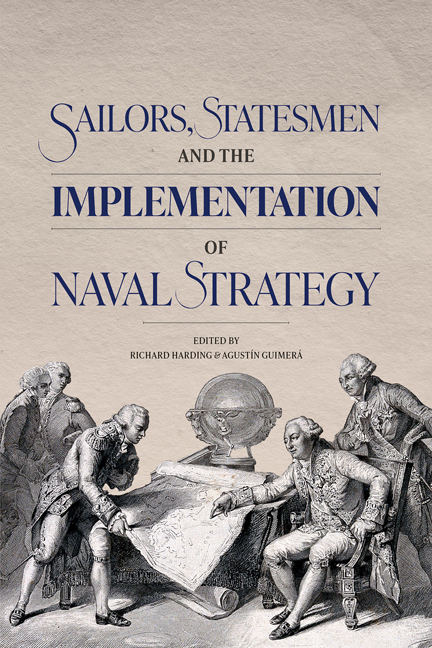Book contents
- Frontmatter
- Dedication
- Contents
- List of Contributors
- Introduction: Naval Leadership: Expertise and Strategy
- 1 The Evolution of French Naval Leadership: Defining the Admiralty of France from the Sixteenth to the Eighteenth Century
- 2 The Makers of Spanish Naval Strategy in the Eighteenth Century: Strategy, Tactics, and Shipbuilding Policy
- 3 Naval Strategic Leadership in Britain, 1739–1748: Political Leaders and Professional Knowledge
- 4 The Statesman and the Naval Leader: The Count of Floridablanca and Navy Minister Antonio Valdés, 1783–1792
- 5 Defining French Eighteenth-Century Naval Strategy
- 6 Casto Méndez Núñez: The Admiral who could have been Regent, 1861–1868
- 7 Teaching by Example: Julian Corbett’s The Campaign of Trafalgar of 1910
- 8 Spanish Naval Leadership during the Second Republic: José Giral Pereira
- 9 The Quest to Understand Naval Leadership: Educating Admirals for High Command in the U.S. Navy from the Eighteenth Century into the Twenty-first Century
- 10 Reflections
- Bibliography
- Index
3 - Naval Strategic Leadership in Britain, 1739–1748: Political Leaders and Professional Knowledge
Published online by Cambridge University Press: 08 May 2024
- Frontmatter
- Dedication
- Contents
- List of Contributors
- Introduction: Naval Leadership: Expertise and Strategy
- 1 The Evolution of French Naval Leadership: Defining the Admiralty of France from the Sixteenth to the Eighteenth Century
- 2 The Makers of Spanish Naval Strategy in the Eighteenth Century: Strategy, Tactics, and Shipbuilding Policy
- 3 Naval Strategic Leadership in Britain, 1739–1748: Political Leaders and Professional Knowledge
- 4 The Statesman and the Naval Leader: The Count of Floridablanca and Navy Minister Antonio Valdés, 1783–1792
- 5 Defining French Eighteenth-Century Naval Strategy
- 6 Casto Méndez Núñez: The Admiral who could have been Regent, 1861–1868
- 7 Teaching by Example: Julian Corbett’s The Campaign of Trafalgar of 1910
- 8 Spanish Naval Leadership during the Second Republic: José Giral Pereira
- 9 The Quest to Understand Naval Leadership: Educating Admirals for High Command in the U.S. Navy from the Eighteenth Century into the Twenty-first Century
- 10 Reflections
- Bibliography
- Index
Summary
The War that Britain fought between 1739 and 1748 has not been considered one in which the strategic, operational, or tactical abilities of its statesmen and military leaders blossomed. In London, Sir Robert Walpole, the duke of Newcastle, the earl of Carteret and almost all their colleagues in the highest positions of state, are usually seen as ill-informed, misguided, and fractious. On the battlefields the likes of the duke of Cumberland, the earl of Stair, Sir John Cope, Henry Hawley, seem to have little grasp of the broader purpose of their campaigns. At sea, Edward Vernon, Thomas Matthews, Charles Knowles, Henry Medley, and John Byng were unable to make good use of Britain's greatest strategic advantage – sea power. At best the war, which for Britain ended with the status quo ante, was solid training for those lights were going to burn brightly eight years later in the Seven Years War – most obviously, the secretary of state for the Southern Department, William Pitt, but also the illustrious commanders, George Anson, Jean-Louis Ligonier, Edward Hawke, Edward Boscawen, Jeffrey Amherst, and James Wolfe.
The transformation of Britain's performance in the two wars has long been associated with the emergence of this new generation of leaders. That they played important roles in the victories is undeniable, but locating the causes of success almost exclusively in the characters of the leaders, throws much else into the shade.
This chapter will focus less on the performance of individual leaders than on the social process of leadership itself. This way of looking at leadership shows that it is not rigidly hierarchical, nor bureaucratically determined. Nor are its outputs the product of a purely scientific rational process. It is not confined to formal organisational ‘commanders’ nor the preserve of a single brain. Leadership at all levels is a social process that exists between people – the leaders and the led – who are in a constant process of renegotiating that relationship and may be changing roles at any time. Even the output of the strategy formulation process – strategic policy – is only one step in actual performance of the organisation.
- Type
- Chapter
- Information
- Publisher: Boydell & BrewerPrint publication year: 2024



